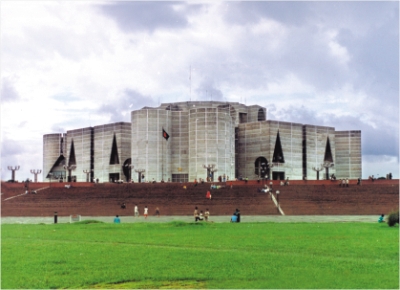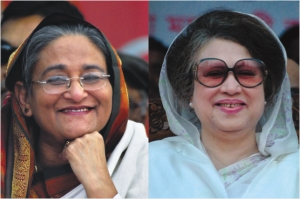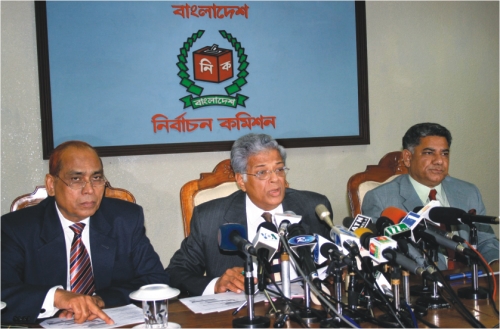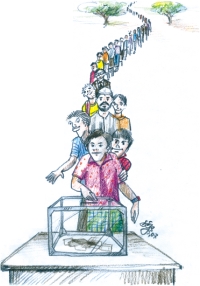
Inside
|
Weighing the Odds Ashfaq Wares Khan takes a look at where the parties are as the election approaches In early September, dark despair was coursing through the core of the Bangladesh Nationalist Party (BNP). From the top brass to the rank and file, there was a hardening awareness that to go to elections in barely two months would be to court disaster. For some, the talk was no longer of defeat, but outright annihilation. A boycott was in serious play. Across town, the BNP's cries of despair were being drowned out by the clamour of Awami League's (AL) premature crowings of self-congratulation. There was talk of an absolute majority of 200 seats in parliament, leaders were discussing possible cabinet posts, while a select few were working hard on a vision for Bangladesh 2021 -- an outline for a decade in power. Two months on and a growing number of political pundits are asking the question: can the AL win the election at all? Forget an absolute majority, could they and their coalition partners even muster the 151 seats required to form a government? The BNP is back in the game, thanks to the release of party chief Khaleda Zia and key leaders, who resurrected a comatose party and breathed new life into a fledgling campaign. Those AL members complacent enough to still predict a landslide are now met with harsh rebukes and dark tales of 1991.
Both parties are already on manoeuvers. In November, the AL was forced to entertain ideas of an Ershad presidency. The BNP humiliated itself by disposing of their own farcical ultimatum when their alliance partner, Jamaat-e-Islami, threatened to run in the elections alone. Fears of a boycott waned as it became increasingly clear that BNP's opposition stemmed from unmet demands rather than a principled objection to elections under the current administration. What has emerged is an election matrix that resembles the traditional tight race between two political foes, rather than a new political landscape. New political players, such as the Progressive Democratic Party, barely rate a mention. Despite protests by the big two that the government will continue to undercut their campaigns and the media's willingness to entertain the farcical circus surrounding their insignificant demands, the fundamentals of Bangladesh politics remain the same. Hence, the most significant question is how much would revelations about the last BNP-led alliance government affect their chances on December 29. In effect, it is more of a referendum on their last term than the last two years of caretaker government rule. The downfall of the BNP after 1/11 was a horror story watched the world over. Seldom has so much political capital been destroyed so quickly. Seldom have the political tables turned so dramatically. The media reports detailing the extravagant, outlandish and often farcical corruption scandals, regardless of the dubious sourcing, destroyed the party's main pillars of its public support. It's not that the AL is immune from such a perception; most surveys indicate the public has a low opinion of both the parties. But, it is more a case of relativity. November's Daily Star/Nielsen poll revealed that far more people associate BNP with corruption than the AL. This larger effect of a popular backlash against the last BNP-led coalition term is a far more potent threat to the coalition on December 29 than any other variable. Luckily for the BNP, the voters are unlikely to react to the BNP-led coalition's association with the rise of militant attacks. Largely due to a lack of media attention to the topic, the BNP is likely to escape any sort of punishment for the number of high-profile assassination of AL leaders, August 21 (2004) grenade attack, and August 17 (2005) bombings. But, our collective attention has been drawn to a number of objections deemed significant by the political parties, and by extension, the media. What we do know, is that even if these issues, such as the amended RPO and absence of convicted candidates, affect the election result, they would not be significant enough to constitute an election game-changing issue. Although both AL and BNP have vehemently objected to the bar on leaders convicted over the last two years, BNP is likely to suffer more because of a higher number of convictions. With 103 (and counting) politicians and businessmen convicted over the past two years, most media reports suggest the parties would be robbed of key candidates. BNP is missing big-ticket names and multi-seat winners like Nazmul Huda, Shajahan Shiraj and Mirza Abbas, not to mention the high-profile candidates such as Mosaddek Ali Falu, Harris Chowdhury and Chittagong's Morshed Khan and Mir Mohammad Nasir. They are struggling to find strong candidates for at least 50 seats, even after nominating candidates' children and recruiting disaffected AL, JP, LDP and PDP leaders strong enough to challenge AL candidates. Importantly, the party's failure to nominate grassroots-endorsed candidates has only exacerbated their problem. However, AL would be unable to use the BNP candidate-crisis because they suffer from the same malaise. They have struggled to find candidates around the country despite a much smaller list of convicted candidates. They will miss strong candidates like Mohammad Nasim and Mofazzal Hossain Chowdhury Maya and have gambled on over a 100 new faces.
That said, it is important to note that AL has managed to unearth new national leaders where the BNP has failed to produce one. The new AL spokesman, Syed Ashraful Islam, has emerged as a shrewd political player who is not only capable of spewing opposition rhetoric but has proved to be a brilliant strategist, organiser, and policy-maker. He navigated the party through the last two years and demonstrated his organisational skills as one of the main architects of AL's new constitution. While his political nous has been showcased in the AL's ability to simultaneously attack the government and also produce a policy vision for the next decade. The BNP, on the other hand, has not produced a single new leader capable of navigating the party through unchartered waters, visible in weak grassroots organisation and failure to design a new constitution. This leadership vacuum has affected the parties' abilities to mobilise the party machine for the campaign. "We need them to organise the party and for their strategic input," said one senior BNP leader. Since most of the absent leaders are not standing committee or presidium members, except the BNP's Moudud Ahmed, both the parties have been able to work well enough to energise the party rank and file for the campaign. The AL, however, did enjoy an advantage of having most of their presidium members available to organise the party while a number of BNP standing committee members were only released in the mass-release in October. But, the BNP leaders, especially since Khaleda Zia's release, have been quick to pick up the pieces and restore the party's chain of command after being devastated by the anti-corruption purge last year. Two crucial decisions by the government would also dash the parties' hopes to have these leaders run in the elections. Firstly, the government's reluctance to repeal clause 91(E) in the new amended Representation of People Order (RPO), which would benefit both parties. Although the BNP has demanded the resignation of the election commissioners and the AL has been complaining of a "conspiracy" to favour "one party," the current EC is far more impartial than the MA Aziz-led gang. Secondly, the decision to lift the emergency after the finalisation of the nominations, which would prevent the parties from taking legal steps to halt proceedings started under the Emergency Power Rules (EPR). The BNP, due to more leaders behind bars, would suffer more under this condition, but unlikely to make a significant contribution to its electoral performance. Similarly, redrawn electorates will not give any significant edge to either of the parties. Many mid-level AL leaders were over the moon at the prospect of electorates being redrawn according to population density. The idea being that this would better reflect the popular vote in parliament, which was taken over by the BNP in a landslide in 2001 despite a tight race in majority votes. However, according to both BNP and AL leaders, this will only affect a handful of electorates, with both parties sharing strengths and weaknesses in thanas and upazilas in the new constituencies. These leave both the parties in a tight race which may be decided by their alliance partners.
At present, the BNP looks likely to continue its ruthless and effective seat-sharing policy of overlooking alliance demands in favour of strong candidates. Regardless, their four-party alliance is again likely to benefit from its partnership with Jamaat, who are more confident going into these elections than they were in 2001. The country's biggest Islamic party's influence was apparent in November when their threat to go to the elections alone reportedly held back the BNP from an outright boycott. Jamaat leaders are publicly and privately boasting they have expanded their based into urban centres in addition to their traditional strongholds in the border areas. But, tensions in the alliance emerged after Jamaat leaders were reportedly fuming at the suggestion that BNP's alliance partners would only get 37 nominations. If this number remains, the BNP candidates will benefit not only from Jamaat endorsements in several key seats, but may also receive support from AL supporters unhappy with their local candidates. Also, the AL would have to shed their misplaced belief in invincibility to woo both the JP and the LDP. With former dictator H.M. Ershad clutching onto his dream of returning to the presidency, the JP are looking to gain greater leverage within the multi-party grand Coalition. Their dominance in greater Rangpur (and reaching out to LDP) is essential for the AL to form a government-forming majority in parliament. But, it is still unclear how the AL and JP would move past the Ershad-as-president scenario. However, even with the JP's likely 15-seat contribution the AL is likely to fall short of its 151 absolute majority. Given such a tight race, this invariably brings us to the question of fairness. This time around, the question is not so much about a proper voter list as it is about the environment and administration of the election itself. No one can argue against the impressive effort to cull the whopping 13 million false and duplicate names off the electoral roll. It is an outstanding achievement, despite being bankrolled by foreign aid, and has not received the plaudits it deserves from the public or the parties. In addition, fears that lifting the state of emergency would result in uncontrollable violence around elections could well be misplaced as the new electoral code of conduct is more severe on electoral violence than the Emergency Power Rules (EPR). That said, a number of frustratingly incomprehensible rules have been set in place by the Election Commission. The most difficult to understand is the seemingly contradictory rule limiting campaigning to only two weeks. How candidates, especially the government's favourite new "honest and competent' candidates," could ever offer voters any substantial personal or policy information within that period is hard to comprehend.
Disturbingly, this makes a serious and dangerous implication that Bangladeshi voters are somehow incapable of making an informed choice and hence, do not need those options. Effectively, this harms new candidates and helps the old guard from the main two parties, as they can bank on their name-recognition without having to worry about threats from better alternatives. No wonder, then, that both the main political parties have largely ignored this issue. Regardless, parties will charge of not having a "level playing field," which of course does not apply nearly as much to this election as much as it did for the planned elections in January 22, 2007. Then there are the intangibles: unforeseeable events such as a massive terrorist attack or a natural disaster. These may delay elections but would not be an election game-changer. I am told there are also fears of intervention by "higher powers." The military, foreign conspirators or militants -- take your pick. But, given how hard the military and Western envoys have forced the negotiation process, it is unlikely they would seek greater meddling in the result as it would only prolong uncertainty and pose serious questions about Bangladesh's democratic future. In politics as in war, the danger is that a retreating army can always adopt a scorched earth policy. If the losing party decides to return to violent ways, this will open up questions of a second election and possibly a far more disturbing scenario of further military intervention. Hopefully, both the winners and losers in this election would recognise what is at stake and will worry about their political future. Both have done enough over the past two decades to not be written off as complete failures. But to go down as the party that destroyed democracy in Bangladesh would surely be a horror beyond imagination and hopefully, a legacy that either party will do anything to avoid.
Ashfaq Wares Khan is a freelance journalist and political analyst.
|



